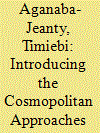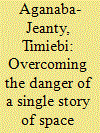| Srl | Item |
| 1 |
ID:
157171


|
|
|
|
|
| Summary/Abstract |
Third World Approaches to International Law or TWAIL is a useful starting point to assess space governance issues from the perspective of emerging or aspirant space actors and users because it helps to highlight imbalances and asymmetry around the supposed “legal right” to space benefit under Article I(1) of the Outer Space Treaty. However, a new analytical lens focused on Cosmopolitan Approaches to International Law or CAIL is proposed that can deconstruct the existing agenda in light of it obscuring the idea of shared benefits without attributing blame, scepticism or negativity, a charge often placed against TWAIL perspectives. This paper asks what one learns from the space law context that prompts us to reorient the frame of analysis that TWAIL perspective brings to bear and focus on a CAILian perspective. Primarily that a TWAILian approach is too one sided and polarized and that a CAILian approach acknowledges reciprocal responsibilities. It highlights the implications of the approach both for emerging and aspirant as well as established space nations specifically and for global space governance in general.
|
|
|
|
|
|
|
|
|
|
|
|
|
|
|
|
| 2 |
ID:
147516


|
|
|
|
|
| Summary/Abstract |
space governance issues from the perspective of emerging or aspirant space actors and users because it helps to highlight imbalances and asymmetry around the “legal right” to space benefit under Article I(1) of the Outer Space Treaty. However, a new analytical lens focused on Cosmopolitan Approaches to International Law or CAIL is proposed that can deconstruct the existing agenda in light of it obscuring the idea of shared benefits without attributing blame, scepticism or negativity. In the quest to ensure fairness to all, including aspirant emerging space actors, largely from developing States, this paper asks what does one learn from the space law context that prompts us to reorient the frame of analysis that Third World Approaches to International Law (TWAIL) perspective brings to bear and focus on a CAILian perspective? Primarily that a TWAILian approach is too one sided and polarized. A CAILian approach however acknowledges reciprocal responsibilities. In conclusion, I am not making a claim here that my CAILian concept has never been articulated before. However, the way I link the concept of Cosmopolitanism with a school of thought that I am sympathetic to (TWAIL) is where this paper provides a novel idea. My specific version of Cosmopolitanism bears in mind the importance of collective ideas. While CAIL will not be free from power asymmetry's because there will always be polarity; it still chooses to focus on the middle ground and not to focus on extremes.
|
|
|
|
|
|
|
|
|
|
|
|
|
|
|
|
| 3 |
ID:
126953


|
|
|
|
|
| Publication |
2013.
|
| Summary/Abstract |
In 2012 a working group was established to formulate the African space policy and strategy which would lead to the establishment of an African Space Agency (ASA). Dr Peter Martinez asserts in his article "Is there a need for an African Space Agency?" [1] that the arguments that have been posited in support of an ASA are flawed; namely the arguments of the existing example of the European Space Agency (ESA), and that an ASA would lead to fostering competition, synergy, industrial development and capacity building. While this viewpoint agrees that all the perfect conditions may not exist at present for the creation of an ASA, it addresses some of the issues raised by Martinez, and proposes ideas to foster intra-regional cooperation.
|
|
|
|
|
|
|
|
|
|
|
|
|
|
|
|
| 4 |
ID:
145034


|
|
|
|
|
| Summary/Abstract |
The concept of sustainable development states that every nation is free to determine how to meet its own needs and accrue its own benefits as long as it does not prejudice the ability of future generations to do the same. This end is challenging in the space domain as the existing emphasis on national concerns obscures the larger issues of international structural inequalities—lack of access, barriers to capacity building and technology absorption—while simultaneously magnifying issues related to market protectionism, which are then disguised as security issues. This article makes the claim that it is possible to correct this distortion while safeguarding the focus on global issues, such as space sustainability. While the concept of space sustainability is understood differently depending on the forum for discussion, it is clear that the dominant understanding coincides with the logic for space cooperation as “Governance for Global Security,” and this focuses more on the needs of the present space actors. Analytical tools designed with the “Cosmopolitan Approaches to International Law” express forms of cooperation that produce reciprocal obligations to enable all participants, both present and aspirant, in space exploration and
|
|
|
|
|
|
|
|
|
|
|
|
|
|
|
|